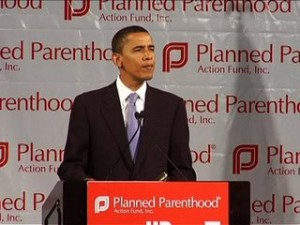Last Friday the Seventh Circuit Court of Appeals ruled that Obama’s abortion mandate could be challenged by employers who feel that the mandate burdens their right to freely exercise their religious beliefs:
The plaintiffs are two Catholic families and their closely held corporations—one a construction company in Illinois and the other a manufacturing firm in Indiana. The businesses are secular and for profit, but they operate in conformity with the faith commitments of the families that own and manage them. The plaintiffs object for religious reasons to providing the mandated coverage. They sued for an exemption on constitutional and statutory grounds.
The mandate, part of the Affordable Care Act, requires employers with fifty or more full-time employees to provide abortion inducing drugs, contraception, and sterilizing procedures as part of health insurance, without allowing employees to share in the cost of these services. Fines for supplying a health insurance plan without the required services are $100 per employee per day, for a total of $36,500 per employee per year. The alternative is to offer no health insurance and incur a fine of $2,000 per employee per year.
Employers running secular businesses that object to the abortion pill mandate on religious grounds want to challenge the law. The Seventh Circuit says they can:
We hold that the plaintiffs—the business owners and their companies—may challenge the mandate. We further hold that compelling them to cover these services substantially burdens their religious-exercise rights.
The Court went so far as to call the government’s arguments on the matter “unsound and extraordinary”:
The government apparently reads this passage as foreclosing all religious-exercise claims arising in the course of commercial activity merely because the context is commercial. That reading is both unsound and extraordinary. … At bottom, the government’s argument is premised on a far-too-narrow view of religious freedom: Religious exercise is protected in the home and the house of worship but not beyond. Religious people do not practice their faith in that compartmentalized way; free-exercise rights are not so circumscribed.
According to Matt Bowman, who argued this case before the Seventh Circuit:
The court’s decision joins the majority of other rulings on the mandate, which have found it to excessively conflict with our nation’s guarantee of religious freedom to all Americans. The decision rightly foresees the dangers of allowing government to have this kind of power. If the government can force family business owners to act contrary to their deepest convictions under the threat of fining them out of business, it is a danger to everybody.







